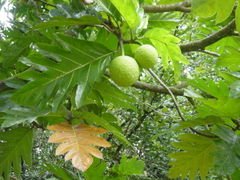5. There is a Hawaiian myth about Ku (which is how Tu was spelled there). Wikipedia: According to an etiological Hawaiian myth, the breadfruit originated from the sacrifice of the war god Ku. After deciding to live secretly among mortals as a farmer, Ku married and had children. He and his family lived happily until a famine seized their island. When he could no longer bear to watch his children suffer, Ku told his wife that he could deliver them from starvation, but to do so he would have to leave them. Reluctantly, she agreed, and at her word, Ku descended into the ground right where he had stood until only the top of his head was visible. His family waited around the spot he had last been, day and night watering it with their tears until suddenly a small green shoot appeared where Ku had stood. Quickly, the shoot grew into a tall and leafy tree that was laden with heavy breadfruits that Ku's family and neighbours gratefully ate, joyfully saved from starvation ...
In general the story is the same as that about Ulu and Mokuola, but the details differ. The 'head' ('breadfruit') is buried (though not its top end) and the result is miraculous - there will be no more starving children. Starvation belongs in winter, not in summer. The sacrifice of the old one presumably happens in winter and the result will be a renewal of light (life). The spirit of the dead 'man' is infused in the next generation, in his successor. He is coming back. Mokuola (Motu-ora) is 'the living (is)land', i.e. the season when Sun once again is ruling in the sky above, when he has returned from Hine-takurua to dwell with Hine-raumati. ... He became a mighty warrior in those days, and was known throughout all the island, so that when he died, his name, Mokuola, was given to the islet in the bay of Hilo where his bones were buried; by which name it is called even to the present time ... Hine is a common name for women in Polynesia and Hine is also a name for Moon. The islet Mokuola (not a place in space but a place in time) lies in the Bay of Hilo, it is said. This is significant because on Easter Island Ohiro was the name for the first night in the month (and on Hawaii it was Hilo). |
